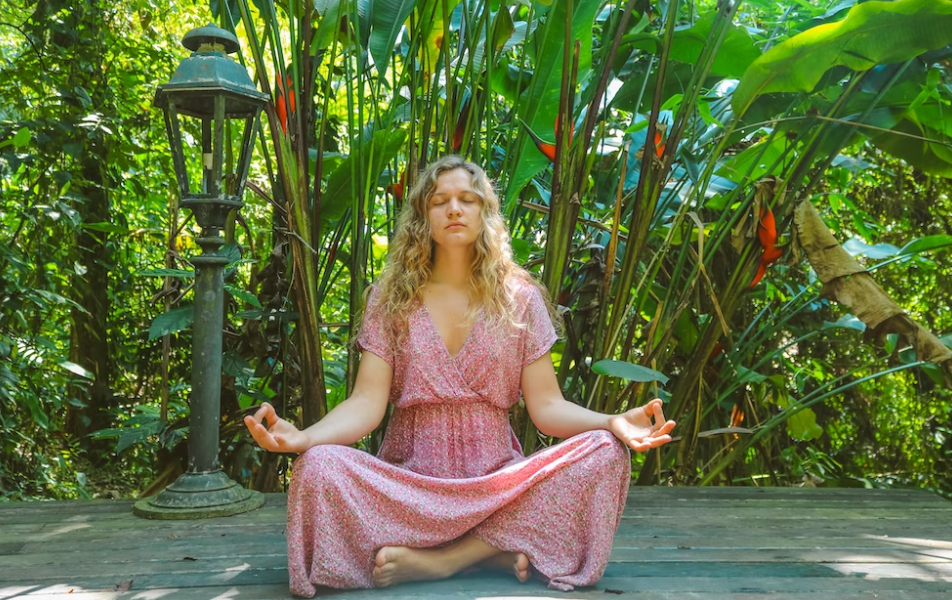Can Meditation Cure Anxiety?
Learn how meditation can help you overcome anxiety and deal with the underlying cause of your anxiety.

Selfpause Affirmation App
Download the app to get 1,000’s of affirmation meditations and everything you need to write, record and listen to your own.
There are a few different techniques that are effective at reducing anxiety. These include relaxation techniques, biofeedback, and mindfulness meditation. However, the most common method is cognitive behavioral therapy. This is a treatment that focuses on the way your mind processes information. Using these techniques will enable you to focus on what’s happening in the present moment.
Mindfulness Meditation

The practice of mindfulness can help you deal with the underlying cause of your anxiety. It also helps you become more aware of your current state. It can help you recognize the different sensations and emotions you are experiencing, and you can learn to acknowledge and let them go. You can also learn to recognize unwholesome mental states and disengage from them.
You can also use the practice of mindfulness to cope with excessive worries. To start, you must become aware of what triggers your feelings of anxiety. Many times, anxiety runs in the background, so it’s important to become aware of these thoughts. You can do this by tuning into your emotions, thoughts, actions, and bodily sensations. Be sure to acknowledge each of them without judgment, and try to move your attention to the present moment. Once you are able to observe the underlying causes of your anxiety, you can start to eliminate them.
Research has shown that a regular practice of mindfulness meditation can reduce the levels of anxiety and improve emotional regulation. There is no requirement to practice meditation for years in order to see these results, however. One study found that participants who practiced mindfulness meditation after only eight weeks showed improvements in their emotional regulation. This suggests that despite the limitations of mindfulness meditation, this practice can help people who suffer from anxiety.
In addition to reducing anxiety levels, it can help a person avoid panic attacks altogether. By developing a daily mindfulness practice, you can reduce the chance of having panic attacks. A daily practice of meditation will also help you cope with stressful situations. By staying present, you will be more able to focus on the present and not worry about the future.
Practicing mindfulness meditation will help you learn to become quiet and focused on the present moment. It will help you live in the present with more joy and less stress.
Relaxation Techniques

Research has shown that applying relaxation techniques to treat anxiety can have positive effects. These techniques have been used to reduce the intensity of physical and mental discomfort in many patients suffering from a variety of medical conditions. While the effectiveness of these techniques is still under debate, the results indicate that these practices can be helpful in reducing anxiety and related symptoms.
One of the most effective relaxation techniques involves practicing deep muscle relaxation. In this exercise, you lock your muscles and then slowly release them. This exercise can retrain your body to relax whenever you feel anxious. Another useful technique involves calm breathing, which helps with concentration and calmness. While practicing this technique requires practice and commitment, it is a great option to use whenever you experience anxiety.
These techniques are not difficult to learn. The key is to make time for them on a regular basis. Try to set aside ten or twenty minutes twice a day to practice them. If you can’t find time for this, you can meditate while commuting to work. You can also practice yoga or tai chi at lunchtime. Mindful walking is also a great option if you’re a busy person.
Another technique that you can try is progressive muscle relaxation. By gently tensing and relaxing different muscle groups, you will be able to reduce bodily tension and quiet your mind. With practice, you can even learn to use progressive muscle relaxation techniques while you’re not experiencing anxiety. Once you’ve mastered this technique, it will be a valuable tool in managing your anxiety.
Another technique is autogenic training, which combines visual imagery and body awareness. In this type of technique, you focus on different physical sensations, like your heartbeat, your breathing rate, and your skin temperature. These techniques can help you improve concentration and sleep, and even help improve your social and emotional stability.
Another technique that helps anxiety patients is mindfulness. This practice helps the patient stay present, without judgment, at the moment. By doing this, they can reduce anxiety by reducing the level of stress hormones in the body.
Cognitive Behavioral Therapy

Cognitive behavioral therapy helps you learn to manage your emotions by helping you recognize and challenge negative thinking. It can help you develop new skills that will help you in real-world situations. For instance, instead of avoiding social situations, you can use social skills like goal-setting. These skills can help you achieve health and wellness goals.
During CBT, therapists will help you recognize your problem behaviors by examining the short-term and long-term consequences of each one. Avoidance-coping behaviors, such as avoiding certain situations, can reduce anxiety in the short term but increase anxiety in the long term. Procrastination, meanwhile, is the opposite of CBT, as it involves delaying a task or decision because of fear and anxiety.
After you’ve identified the reasons for your anxiety, you can focus on changing your behavior. The process is a gradual process, and it can take some time. At first, you may even feel worse. But if you stick with the treatment and follow the advice of your therapist, you’ll see results that last over time.
Cognitive behavioral therapy for anxiety is a step-by-step process that can help you reduce the levels of anxiety in your life. The first step is to learn how to relax. This involves learning breathing exercises, mindfulness techniques, and calming thoughts. Once you’ve learned these, you can start exposing yourself to higher-risk situations and gradually learn to tolerate them.
Exposure therapy is a form of CBT that helps you overcome fears by slowly entering a feared situation. This approach reduces the intensity of your reactions to the situation. It also teaches you skills to resist compulsive urges. With a little exposure, you will begin to feel less anxious.
Cognitive behavioral therapy is highly effective for treating anxiety and depression. However, results vary from person to person and may take longer in some cases. Some people may need multiple therapies or have other co-occurring conditions. The most effective cognitive behavioral therapy involves altering your thought patterns. Most patients can see results in 12 to 16 weeks.
Cognitive behavioral therapy helps people become aware of their unhelpful thoughts and beliefs. It also helps them develop healthier and more realistic thoughts that can alleviate the symptoms of anxiety and depression.
Biofeedback

The use of biofeedback therapy to cure anxiety has several benefits. It has been found to help cut down on the use of pharmaceutical anxiety medications. However, before using biofeedback to treat anxiety, you should always consult with your healthcare team. This will ensure that you get the best results. In addition, biofeedback therapy can help you feel less frightened and more relaxed.
Biofeedback is a complementary treatment for a number of conditions, including anxiety and depression. Many medical professionals consider it a safe alternative to medication for these conditions. Some insurance companies cover biofeedback, while others don’t. It is important to check with your insurance company before starting any treatment, as some won’t pay for more than a few sessions.
Biofeedback is an effective method for curing anxiety because it uses the power of the mind to promote relaxation. It works by monitoring physiological processes and showing them to the wearer on a screen. It uses various instruments, including electrodes and finger sensors, to measure the heart rate and muscle tension. It also teaches you to control those bodily processes.
Biofeedback sessions are typically scheduled on a weekly basis. Some people may require six to eight sessions, depending on the severity of their condition and the speed at which they learn. Generally, biofeedback sessions last from forty to fifty minutes. Afterward, patients can practice biofeedback at home by using a free app.
A recent study comparing biofeedback with psychotherapy shows that biofeedback is highly effective for treating anxiety and depression. In fact, Caldwell and his colleagues found that people who received biofeedback had lower levels of depression than those who received psychotherapy alone. The results are encouraging. The results were statistically significant.
Biofeedback is a powerful tool for boosting mental and physical health. Through the use of sensors and computer programs, the biofeedback practitioner is able to help individuals become more aware of their bodily functions and consciously regulate them. UCSF’s Osher Center for Integrative Medicine offers biofeedback services for a variety of health problems. A certified biofeedback practitioner can help you identify unhealthy patterns and teach you how to change them.
Overall, there are many types of meditation that can help address anxiety, give them a try and see what works best for you, and take on your life free of anxiety.
Our Top FAQ's
Some potential benefits of meditation for anxiety include reducing stress and tension, improving mood, and increasing overall feelings of calm and relaxation. Regular meditation practice can also help to improve focus and concentration, and may even have positive effects on physical health.
While meditation can be a useful tool for managing anxiety, it is not typically recommended as a standalone treatment for anxiety disorders. Instead, it is often recommended as part of a comprehensive treatment plan that may include other therapies such as cognitive-behavioral therapy (CBT) and medication.
There are many different types of meditation that can be helpful for anxiety, including mindfulness meditation, breathing meditation, and loving-kindness meditation. The type of meditation that is most effective for anxiety will depend on the individual and their specific needs and preferences.
If you are new to meditation and want to try it to help with your anxiety, there are many resources available to help you get started. This can include books, online guides, apps, or classes taught by experienced meditation teachers. It is also a good idea to talk to your healthcare provider about your interest in meditation and ask for recommendations on where to start.
As with any treatment for anxiety, there may be some potential drawbacks or risks to using meditation. For example, some people may find it difficult to quiet their mind and achieve a meditative state, especially if they are new to meditation or have a lot of anxious thoughts. Additionally, some people may find that certain types of meditation do not work for them, or that they experience temporary increases in anxiety during or after meditation. It is important to discuss any concerns with a healthcare provider and to approach meditation with patience and self-compassion.
